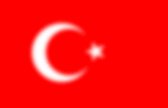

Brand Turkey and the Gezi Protests: Authoritarianism, Law, and Neoliberalism (Part Two) [Part one of this article can be found here.]
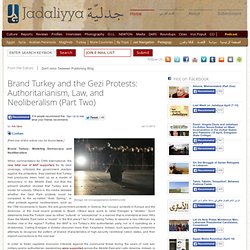
Brand Turkey: Modeling Democracy and Neoliberalism. Turkey’s Economic Miracle Under Fire. Turkey’s prime minister supports right to dissent in other countries, but not at home LONDON: Turkey’s political stability under Prime Minister Recep Tayyip Erdoğan and its integration into the globalized economy helped turn it into a regional power.
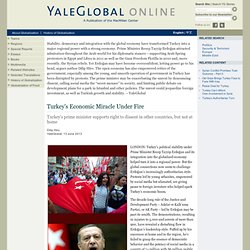
But the global connections now seem to challenge Erdoğan’s increasingly authoritarian style. Protests led by young urbanites, empowered by social media but alienated, are giving pause to foreign investors who helped spark Turkey’s economic boom. The decade-long rule of the Justice and Development Party – Adalat ve Kalk’nma Partisi, or AK Party – led by Erdoğan may be past its zenith.
Turkey’s protests: Still out on the streets. Turkey Media Roundup (July 2) [This is a roundup of news articles and other materials circulating on Turkey and reflects a wide variety of opinions.
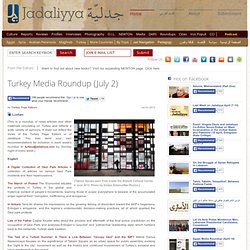
It does not reflect the views of the Turkey Page Editors or of Jadaliyya. You may send your own recommendations for inclusion in each week's roundup to turkey@jadaliyya.com by Sunday night of every week.] English. Protest, Politics and Paternalism in Turkey. Turkey’s ongoing protests may yet lead to a backlash from the government’s supporters and a new ‘Turkish winter’ As street protests in Turkey continue, and the government’s response has begun to harden, many are now talking about a coming ‘Turkish spring’.
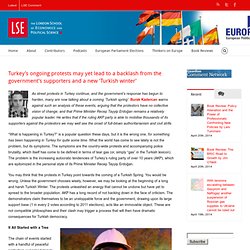
Burak Kadercan warns against such an analysis of these events, arguing that the protestors have no collective vision of change, and that Prime Minister Recep Tayyip Erdoğan remains a relatively popular leader. He writes that if the ruling AKP party is able to mobilise thousands of its supporters against the protestors we may well see the onset of full-blown authoritarianism and civil strife. “What is happening in Turkey?” Is a popular question these days, but it is the wrong one, for something has been happening in Turkey for quite some time. Law of the Father. Now that the Gezi Park occupation is over, everyone wants to know who won.
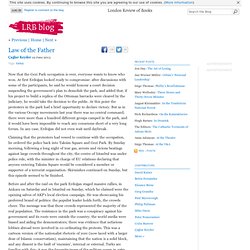
At first Erdoğan looked ready to compromise: after discussions with some of the participants, he said he would honour a court decision suspending the government’s plan to demolish the park, and added that, if his project to build a replica of the Ottoman barracks were cleared by the judiciary, he would take the decision to the public. At this point the protesters in the park had a brief opportunity to declare victory.
But as in the various Occupy movements last year there was no central command; there were more than a hundred different groups camped in the park, and it would have been impossible to reach any consensus short of a very long forum. In any case, Erdoğan did not even wait until daybreak. Erdogan’s Masculinity and the Language of the Gezi Resistance. Most observers of Turkey have been surprised by Prime Minister Recep Tayyip Erdoğan’s unwillingness to compromise with the Gezi Park protestors, whose resistance for the preservation of an İstanbul park has transformed into a nationwide wave of popular urban protests—despite ongoing efforts at violent suppression—and threatens to become a full-fledged political, and economic, crisis.
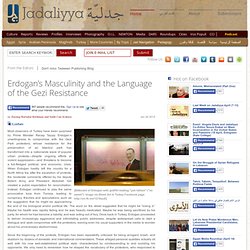
When Erdoğan hastily left the country for a North Africa trip after the escalation of protests, the moderate comments offered by his deputy Bülent Arınç and President Abdullah Gül created a public expectation for reconciliation. Instead, Erdoğan continued to play the same provocative tune from Tunisia, leading to conspiracy theories and speculations, such as the suggestion that he might be approaching the end of his biological and/or political life. The word on the street suggested that he might be “losing it.” Maybe his health was rapidly failing and he was heavily medicated.
Brand Turkey and the Gezi Protests: Authoritarianism, Law, and Neoliberalism (Part One) Neoliberalism, Illegality, and State of Exception in Turkey The Gezi Park protests, and the state response to them, have crystallized larger dynamics in Turkey.
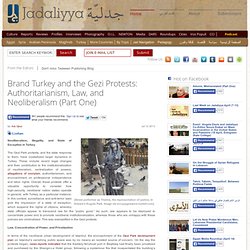
These include recent legal changes and their contribution to the institutionalization of neoliberalism, centralization of powers, allegations of cronyism, authoritarianism, and encroachment on professional independence and labor rights. Overall, these protests offer a valuable opportunity to consider how high-security, neoliberal nation states operate in general, with Turkey as a particular instance. Erdogan's mishandling of protests has exposed the myth of a stable Turkey - Comment - Voices. There was a time when brutality by the security forces was easier to keep off TV screens by censorship or frightening journalists and media-owners.
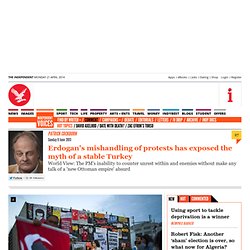
But these mechanisms no longer work when people have a multitude of TV channels inside and outside the country to choose from. Running documentaries on penguins, as CNN Turkey notoriously did, simply creates a vacuum of information which is rapidly filled by protesters. The government's version of what is happening becomes self-marginalised and is ignored. It is astonishing that skilled politicians such as the Prime Minister, Recep Tayyip Erdogan, and those around him should make so many mistakes in such a short time. It is easy to why Zine el-Abidine Ben Ali of Tunisia and Hosni Mubarak of Egypt should have miscalculated popular reaction to repression at the start of the Arab uprisings in 2011, because as rulers of police states their approach to public opinion was to ignore it.
But how did Erdogan fall into the same trap?